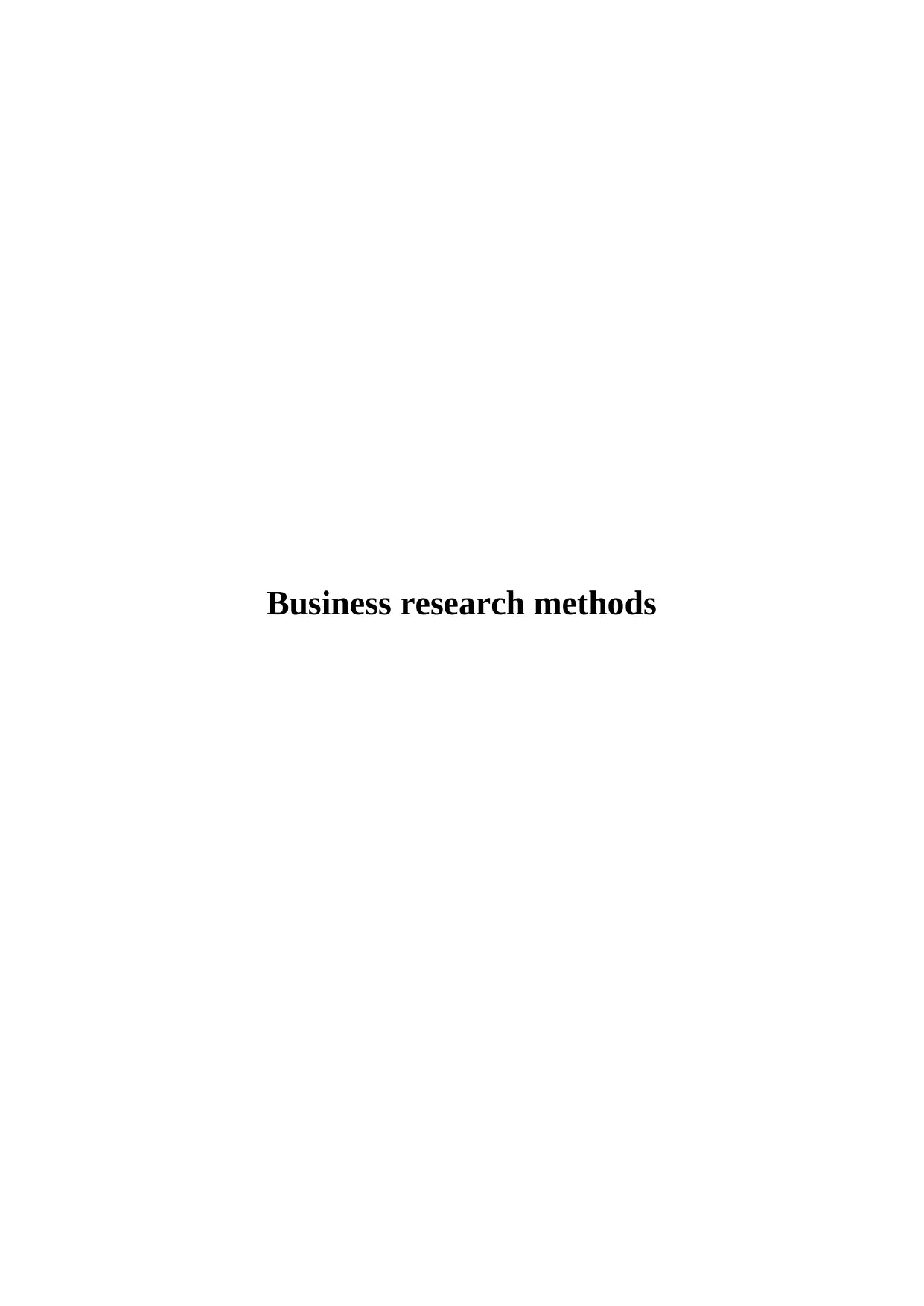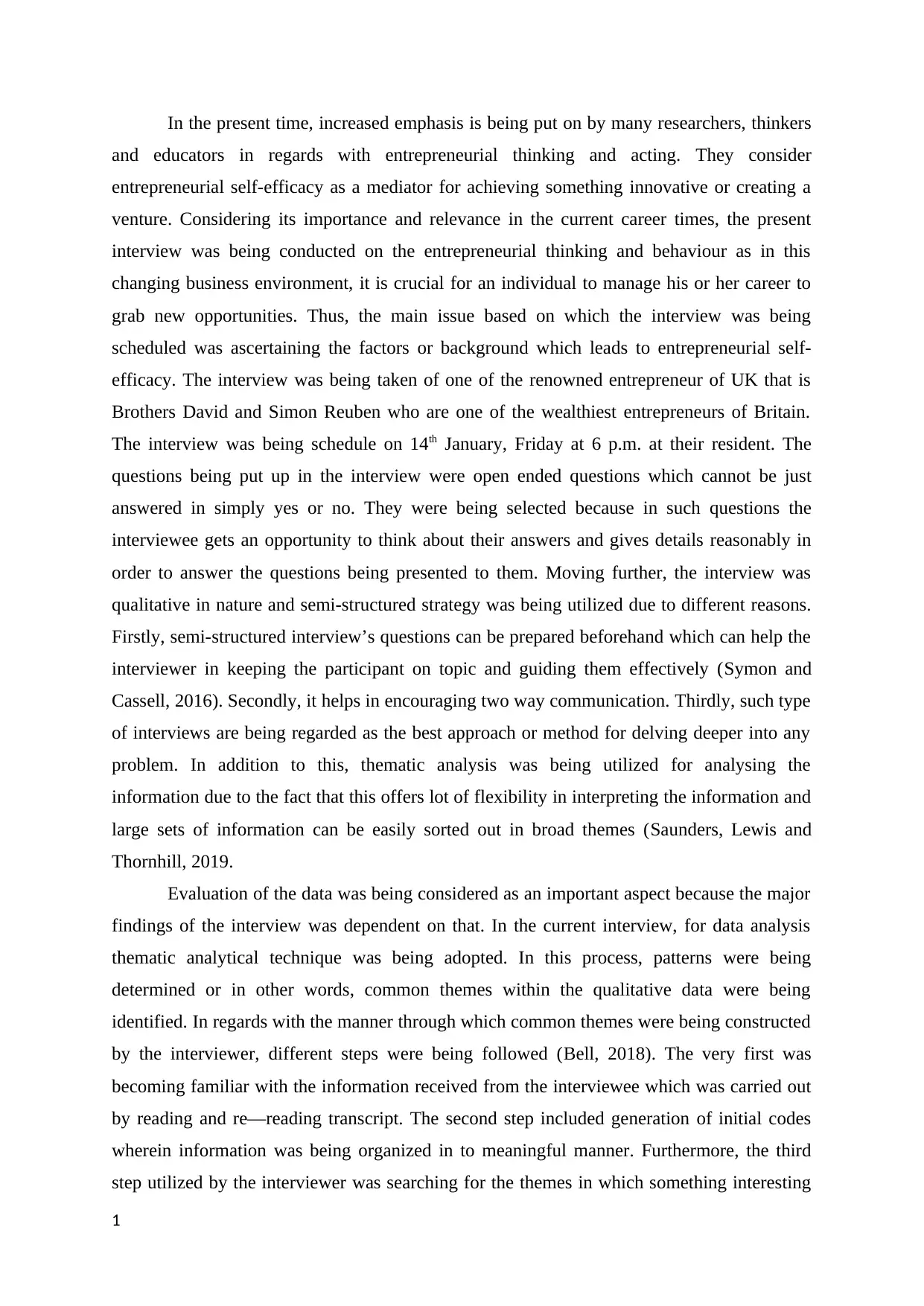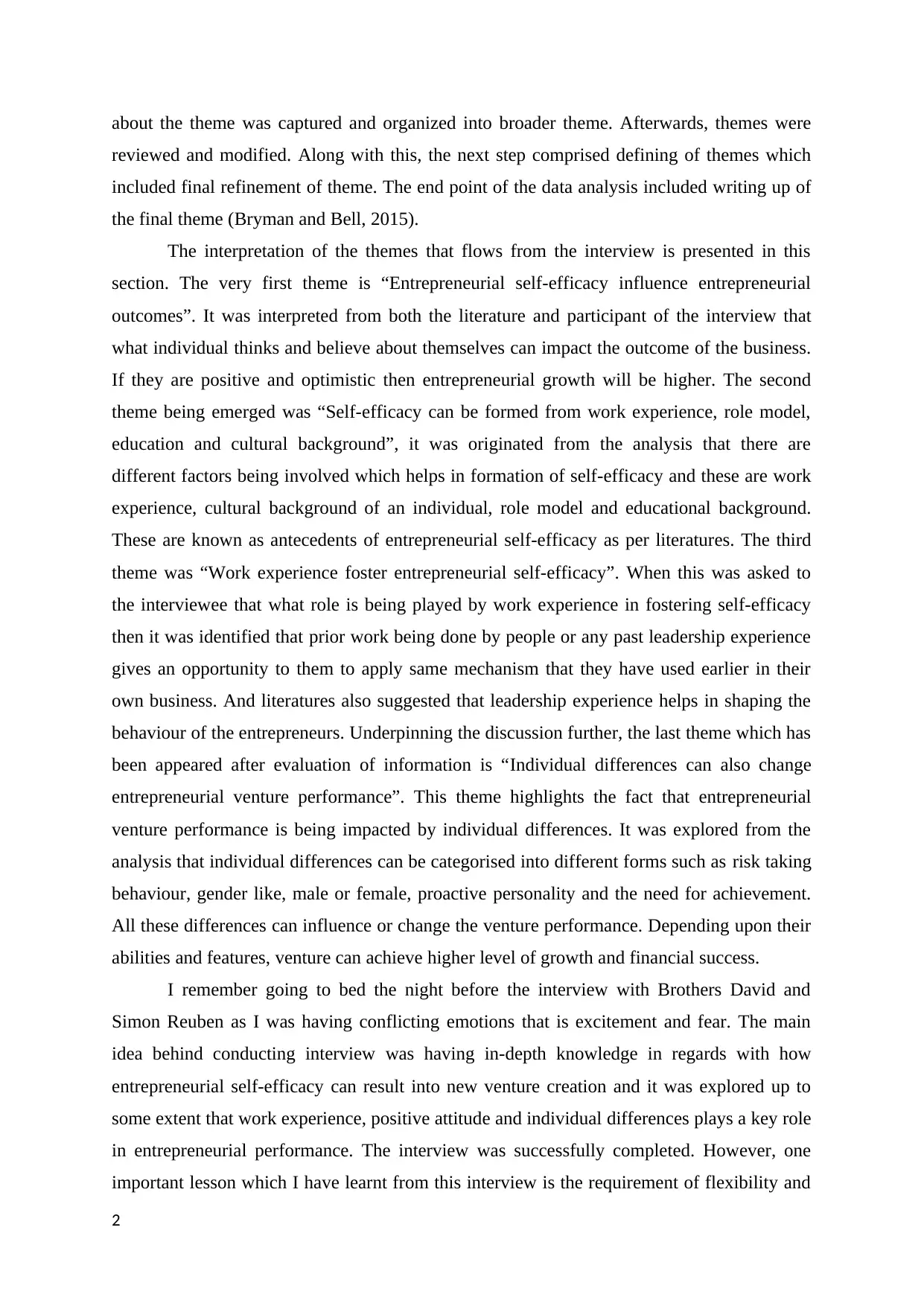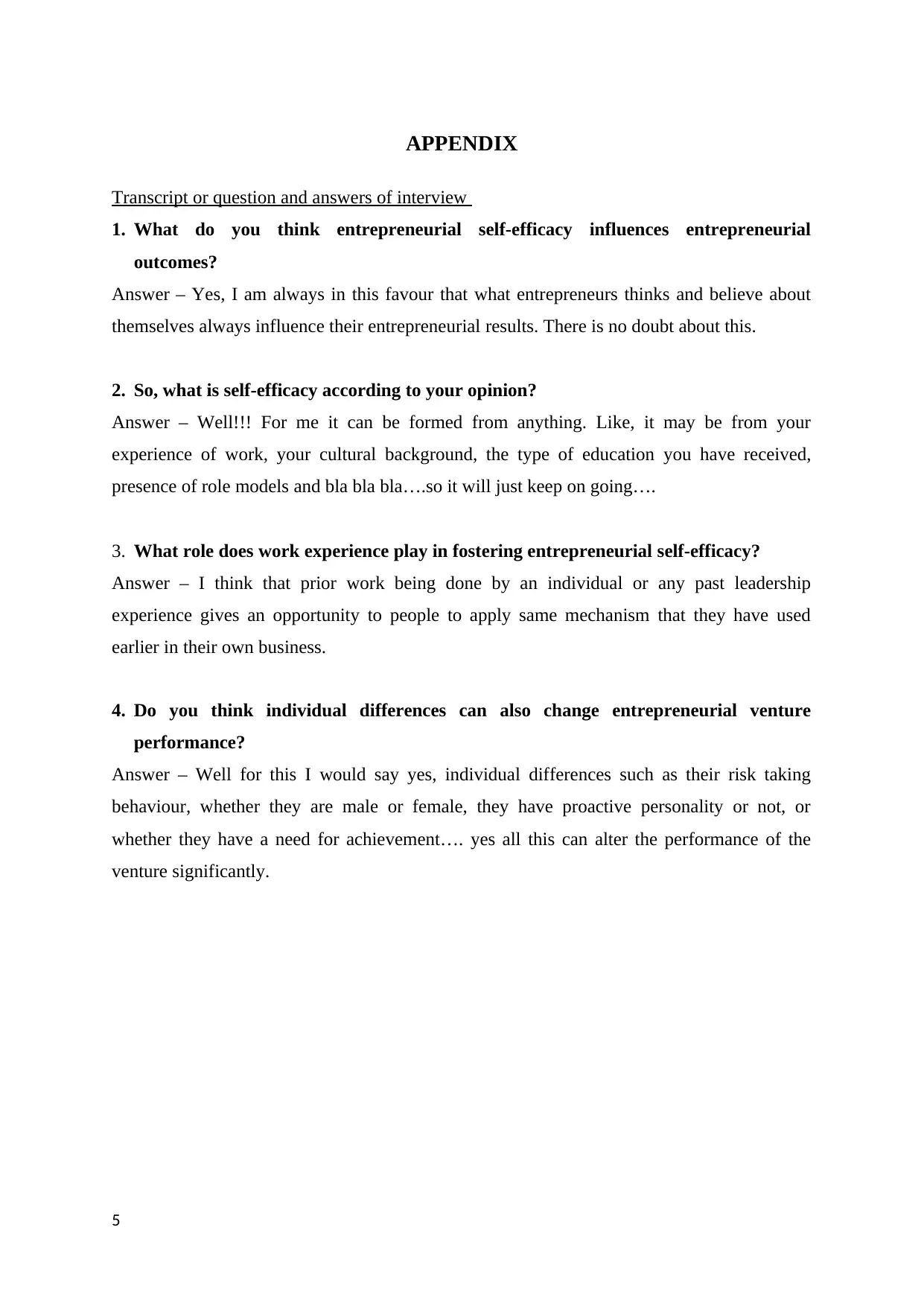Business Research: Unveiling Factors of Entrepreneurial Self-Efficacy
VerifiedAdded on 2023/06/14
|6
|1434
|61
Report
AI Summary
This report presents an analysis of entrepreneurial self-efficacy based on an interview with UK entrepreneurs, Brothers David and Simon Reuben. The study employs a qualitative, semi-structured interview approach and utilizes thematic analysis to identify key factors influencing entrepreneurial self-efficacy. The analysis reveals four primary themes: the influence of entrepreneurial self-efficacy on outcomes, the formation of self-efficacy through various experiences and backgrounds, the role of work experience in fostering self-efficacy, and the impact of individual differences on venture performance. The report reflects on the interview process, highlighting lessons learned and limitations encountered during data analysis. Desklib provides access to this and other solved assignments to support students.

Business research methods
Paraphrase This Document
Need a fresh take? Get an instant paraphrase of this document with our AI Paraphraser

In the present time, increased emphasis is being put on by many researchers, thinkers
and educators in regards with entrepreneurial thinking and acting. They consider
entrepreneurial self-efficacy as a mediator for achieving something innovative or creating a
venture. Considering its importance and relevance in the current career times, the present
interview was being conducted on the entrepreneurial thinking and behaviour as in this
changing business environment, it is crucial for an individual to manage his or her career to
grab new opportunities. Thus, the main issue based on which the interview was being
scheduled was ascertaining the factors or background which leads to entrepreneurial self-
efficacy. The interview was being taken of one of the renowned entrepreneur of UK that is
Brothers David and Simon Reuben who are one of the wealthiest entrepreneurs of Britain.
The interview was being schedule on 14th January, Friday at 6 p.m. at their resident. The
questions being put up in the interview were open ended questions which cannot be just
answered in simply yes or no. They were being selected because in such questions the
interviewee gets an opportunity to think about their answers and gives details reasonably in
order to answer the questions being presented to them. Moving further, the interview was
qualitative in nature and semi-structured strategy was being utilized due to different reasons.
Firstly, semi-structured interview’s questions can be prepared beforehand which can help the
interviewer in keeping the participant on topic and guiding them effectively (Symon and
Cassell, 2016). Secondly, it helps in encouraging two way communication. Thirdly, such type
of interviews are being regarded as the best approach or method for delving deeper into any
problem. In addition to this, thematic analysis was being utilized for analysing the
information due to the fact that this offers lot of flexibility in interpreting the information and
large sets of information can be easily sorted out in broad themes (Saunders, Lewis and
Thornhill, 2019.
Evaluation of the data was being considered as an important aspect because the major
findings of the interview was dependent on that. In the current interview, for data analysis
thematic analytical technique was being adopted. In this process, patterns were being
determined or in other words, common themes within the qualitative data were being
identified. In regards with the manner through which common themes were being constructed
by the interviewer, different steps were being followed (Bell, 2018). The very first was
becoming familiar with the information received from the interviewee which was carried out
by reading and re—reading transcript. The second step included generation of initial codes
wherein information was being organized in to meaningful manner. Furthermore, the third
step utilized by the interviewer was searching for the themes in which something interesting
1
and educators in regards with entrepreneurial thinking and acting. They consider
entrepreneurial self-efficacy as a mediator for achieving something innovative or creating a
venture. Considering its importance and relevance in the current career times, the present
interview was being conducted on the entrepreneurial thinking and behaviour as in this
changing business environment, it is crucial for an individual to manage his or her career to
grab new opportunities. Thus, the main issue based on which the interview was being
scheduled was ascertaining the factors or background which leads to entrepreneurial self-
efficacy. The interview was being taken of one of the renowned entrepreneur of UK that is
Brothers David and Simon Reuben who are one of the wealthiest entrepreneurs of Britain.
The interview was being schedule on 14th January, Friday at 6 p.m. at their resident. The
questions being put up in the interview were open ended questions which cannot be just
answered in simply yes or no. They were being selected because in such questions the
interviewee gets an opportunity to think about their answers and gives details reasonably in
order to answer the questions being presented to them. Moving further, the interview was
qualitative in nature and semi-structured strategy was being utilized due to different reasons.
Firstly, semi-structured interview’s questions can be prepared beforehand which can help the
interviewer in keeping the participant on topic and guiding them effectively (Symon and
Cassell, 2016). Secondly, it helps in encouraging two way communication. Thirdly, such type
of interviews are being regarded as the best approach or method for delving deeper into any
problem. In addition to this, thematic analysis was being utilized for analysing the
information due to the fact that this offers lot of flexibility in interpreting the information and
large sets of information can be easily sorted out in broad themes (Saunders, Lewis and
Thornhill, 2019.
Evaluation of the data was being considered as an important aspect because the major
findings of the interview was dependent on that. In the current interview, for data analysis
thematic analytical technique was being adopted. In this process, patterns were being
determined or in other words, common themes within the qualitative data were being
identified. In regards with the manner through which common themes were being constructed
by the interviewer, different steps were being followed (Bell, 2018). The very first was
becoming familiar with the information received from the interviewee which was carried out
by reading and re—reading transcript. The second step included generation of initial codes
wherein information was being organized in to meaningful manner. Furthermore, the third
step utilized by the interviewer was searching for the themes in which something interesting
1

about the theme was captured and organized into broader theme. Afterwards, themes were
reviewed and modified. Along with this, the next step comprised defining of themes which
included final refinement of theme. The end point of the data analysis included writing up of
the final theme (Bryman and Bell, 2015).
The interpretation of the themes that flows from the interview is presented in this
section. The very first theme is “Entrepreneurial self-efficacy influence entrepreneurial
outcomes”. It was interpreted from both the literature and participant of the interview that
what individual thinks and believe about themselves can impact the outcome of the business.
If they are positive and optimistic then entrepreneurial growth will be higher. The second
theme being emerged was “Self-efficacy can be formed from work experience, role model,
education and cultural background”, it was originated from the analysis that there are
different factors being involved which helps in formation of self-efficacy and these are work
experience, cultural background of an individual, role model and educational background.
These are known as antecedents of entrepreneurial self-efficacy as per literatures. The third
theme was “Work experience foster entrepreneurial self-efficacy”. When this was asked to
the interviewee that what role is being played by work experience in fostering self-efficacy
then it was identified that prior work being done by people or any past leadership experience
gives an opportunity to them to apply same mechanism that they have used earlier in their
own business. And literatures also suggested that leadership experience helps in shaping the
behaviour of the entrepreneurs. Underpinning the discussion further, the last theme which has
been appeared after evaluation of information is “Individual differences can also change
entrepreneurial venture performance”. This theme highlights the fact that entrepreneurial
venture performance is being impacted by individual differences. It was explored from the
analysis that individual differences can be categorised into different forms such as risk taking
behaviour, gender like, male or female, proactive personality and the need for achievement.
All these differences can influence or change the venture performance. Depending upon their
abilities and features, venture can achieve higher level of growth and financial success.
I remember going to bed the night before the interview with Brothers David and
Simon Reuben as I was having conflicting emotions that is excitement and fear. The main
idea behind conducting interview was having in-depth knowledge in regards with how
entrepreneurial self-efficacy can result into new venture creation and it was explored up to
some extent that work experience, positive attitude and individual differences plays a key role
in entrepreneurial performance. The interview was successfully completed. However, one
important lesson which I have learnt from this interview is the requirement of flexibility and
2
reviewed and modified. Along with this, the next step comprised defining of themes which
included final refinement of theme. The end point of the data analysis included writing up of
the final theme (Bryman and Bell, 2015).
The interpretation of the themes that flows from the interview is presented in this
section. The very first theme is “Entrepreneurial self-efficacy influence entrepreneurial
outcomes”. It was interpreted from both the literature and participant of the interview that
what individual thinks and believe about themselves can impact the outcome of the business.
If they are positive and optimistic then entrepreneurial growth will be higher. The second
theme being emerged was “Self-efficacy can be formed from work experience, role model,
education and cultural background”, it was originated from the analysis that there are
different factors being involved which helps in formation of self-efficacy and these are work
experience, cultural background of an individual, role model and educational background.
These are known as antecedents of entrepreneurial self-efficacy as per literatures. The third
theme was “Work experience foster entrepreneurial self-efficacy”. When this was asked to
the interviewee that what role is being played by work experience in fostering self-efficacy
then it was identified that prior work being done by people or any past leadership experience
gives an opportunity to them to apply same mechanism that they have used earlier in their
own business. And literatures also suggested that leadership experience helps in shaping the
behaviour of the entrepreneurs. Underpinning the discussion further, the last theme which has
been appeared after evaluation of information is “Individual differences can also change
entrepreneurial venture performance”. This theme highlights the fact that entrepreneurial
venture performance is being impacted by individual differences. It was explored from the
analysis that individual differences can be categorised into different forms such as risk taking
behaviour, gender like, male or female, proactive personality and the need for achievement.
All these differences can influence or change the venture performance. Depending upon their
abilities and features, venture can achieve higher level of growth and financial success.
I remember going to bed the night before the interview with Brothers David and
Simon Reuben as I was having conflicting emotions that is excitement and fear. The main
idea behind conducting interview was having in-depth knowledge in regards with how
entrepreneurial self-efficacy can result into new venture creation and it was explored up to
some extent that work experience, positive attitude and individual differences plays a key role
in entrepreneurial performance. The interview was successfully completed. However, one
important lesson which I have learnt from this interview is the requirement of flexibility and
2
⊘ This is a preview!⊘
Do you want full access?
Subscribe today to unlock all pages.

Trusted by 1+ million students worldwide

my speed. Other than this, I also find dome difficulties in analysing the information as I had
very little experience regarding thematic analysis. Overall, it can be said that the quality of
result was good however if more time was given to me, it would have been more successful.
In addition to this, one of the biggest limitation of using interview to study my topic was
dealing with refusal. There were some questions which interviewee refused to answer.
Additionally, there was one limitation of thematic analysis which I used for evaluating
information and that was lack of coherence at the time of evolving themes from the
information.
3
very little experience regarding thematic analysis. Overall, it can be said that the quality of
result was good however if more time was given to me, it would have been more successful.
In addition to this, one of the biggest limitation of using interview to study my topic was
dealing with refusal. There were some questions which interviewee refused to answer.
Additionally, there was one limitation of thematic analysis which I used for evaluating
information and that was lack of coherence at the time of evolving themes from the
information.
3
Paraphrase This Document
Need a fresh take? Get an instant paraphrase of this document with our AI Paraphraser

REFERENCES
Books and journals
Bell, E., 2018. Business Research Methods. 5thed. OUP.
Bryman, A. and Bell, E., 2015. Business Research Methods. 4thed. Oxford University Press.
Saunders, M.N.K., Lewis, P. and Thornhill, A., 2019. Research Methods for Business
Students. 8thed. Pearson.
Symon, G. and Cassell, C., 2016. Qualitative Organizational Research: Core Methods and
Current Challenges. SAGE.
4
Books and journals
Bell, E., 2018. Business Research Methods. 5thed. OUP.
Bryman, A. and Bell, E., 2015. Business Research Methods. 4thed. Oxford University Press.
Saunders, M.N.K., Lewis, P. and Thornhill, A., 2019. Research Methods for Business
Students. 8thed. Pearson.
Symon, G. and Cassell, C., 2016. Qualitative Organizational Research: Core Methods and
Current Challenges. SAGE.
4

APPENDIX
Transcript or question and answers of interview
1. What do you think entrepreneurial self-efficacy influences entrepreneurial
outcomes?
Answer – Yes, I am always in this favour that what entrepreneurs thinks and believe about
themselves always influence their entrepreneurial results. There is no doubt about this.
2. So, what is self-efficacy according to your opinion?
Answer – Well!!! For me it can be formed from anything. Like, it may be from your
experience of work, your cultural background, the type of education you have received,
presence of role models and bla bla bla….so it will just keep on going….
3. What role does work experience play in fostering entrepreneurial self-efficacy?
Answer – I think that prior work being done by an individual or any past leadership
experience gives an opportunity to people to apply same mechanism that they have used
earlier in their own business.
4. Do you think individual differences can also change entrepreneurial venture
performance?
Answer – Well for this I would say yes, individual differences such as their risk taking
behaviour, whether they are male or female, they have proactive personality or not, or
whether they have a need for achievement…. yes all this can alter the performance of the
venture significantly.
5
Transcript or question and answers of interview
1. What do you think entrepreneurial self-efficacy influences entrepreneurial
outcomes?
Answer – Yes, I am always in this favour that what entrepreneurs thinks and believe about
themselves always influence their entrepreneurial results. There is no doubt about this.
2. So, what is self-efficacy according to your opinion?
Answer – Well!!! For me it can be formed from anything. Like, it may be from your
experience of work, your cultural background, the type of education you have received,
presence of role models and bla bla bla….so it will just keep on going….
3. What role does work experience play in fostering entrepreneurial self-efficacy?
Answer – I think that prior work being done by an individual or any past leadership
experience gives an opportunity to people to apply same mechanism that they have used
earlier in their own business.
4. Do you think individual differences can also change entrepreneurial venture
performance?
Answer – Well for this I would say yes, individual differences such as their risk taking
behaviour, whether they are male or female, they have proactive personality or not, or
whether they have a need for achievement…. yes all this can alter the performance of the
venture significantly.
5
⊘ This is a preview!⊘
Do you want full access?
Subscribe today to unlock all pages.

Trusted by 1+ million students worldwide
1 out of 6
Related Documents
Your All-in-One AI-Powered Toolkit for Academic Success.
+13062052269
info@desklib.com
Available 24*7 on WhatsApp / Email
![[object Object]](/_next/static/media/star-bottom.7253800d.svg)
Unlock your academic potential
Copyright © 2020–2026 A2Z Services. All Rights Reserved. Developed and managed by ZUCOL.





